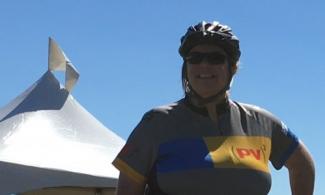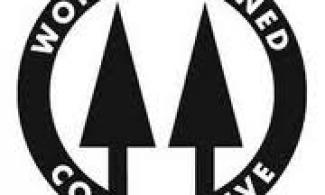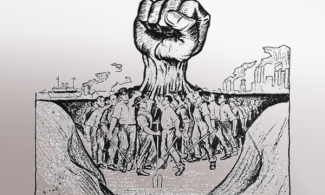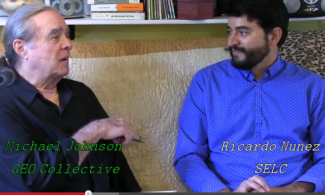
An Interview with Kim Pinkham of PV Squared
[Editor's note: This interview with Kim Pinkham of PV Squared (Pioneer Valley Photovoltaics Cooperative) was conducted on March 27th, 2008, as part of the research for the book Building Co-operative Power. PV Squared opened their doors 18 years ago as a group of just 4 people. By the time this interview was conducted, five years later, they had grown to 11. Today their website lists 46 members and employees.]
Transcribed by Janelle Cornwell.
Michael Johnson: [You're] from PV Squared.
Kim Pinkham: Also known as Pioneer Valley Photovoltaics Cooperative.
Michael Johnson: Okay, good. Just briefly tell me about the cooperative.
Kim Pinkham: Meaning what do we do?
Michael Johnson: What you do, and how many…
Kim Pinkham: We are a custom design and installation house for renewable energy systems – meaning solar electric, solar hot water, wind and small hydro. We are a worker-owned cooperative with currently 5 worker-owners. We also employ 6 other people at this point who are on track for worker-ownership but have not yet been invited to become worker-owners. We have two offices; one in Greenfield MA and one in New Britain, Connecticut. And we have been in business for – it’s coming up on 6 years. May will be our sixth year since our incorporation; we opened our doors in March 1st of 2003. So this is kind of a banner year for us to be open for 5 years is a big deal – everyone tells us – we’re impressed that we’re still here. But everyone tells us that it’s a big deal so that’s pretty exciting.
The business has expanded quite a lot in, I would say, the last two years. The first three or so years we sort of struggled to get off the ground at all; we struggled to make a name for ourselves, to figure out what kind of work we really wanted to do; we learned about how to be in our industry and that was a learning process and at that point we were just four people – we were the four founding worker owners; we hadn’t taken on any other staff and...coming up on three years ago in July, we took on the person who is now our 5th worker-owner, who brought with him John... He brought with him a lot of project management experience that was transferable from other industries to our company and that seemed to be really what we lacked at the time in order to become the kind of professionals that we knew we could be. We just didn’t have the skill set available to us yet.
So that was kind of a turning point for PV Squared and since then every year we’ve doubled our sales – this most recent year we did $1.7 million in sales. Which is [good], comparatively speaking – the year before we had done just under a million in sales. So, it’s a lot of growth for us. It’s pretty exciting, we’re on track this year to hopefully break 2 million – we think we might do 2.3 million, 2.4 million from a sales projection stand point. So that’s kind of the nuts and bolts of what we do.
The other half of your question I believe was how we do it?
Michael Johnson: Well, we’ll get to that. How do the five [worker-owners] and six employees – are they like in apprenticeship?
Kim Pinkham: Sort of. They’re employed – just like they have a job with our company. PV Squared is different than a lot of worker co-ops that I know of, in that we have a relatively long – I guess you could call it a dating period – before we get married. There are worker co-ops that we know of that have a longer time, but we generally see that we’re inviting people onboard around year three, after they’ve worked for us for about three years. Part of the reason that we have a long sort of trial period, I guess you might say, or working period is just because we’re in a specialized industry; we ask for people to really sort of integrate in a pretty tight team and need to have certain skill sets, a certain sort of adaptability – the ability to be able to do more than one thing in the company. And if a person doesn’t fit solidly into the team, it makes it difficult for us to accomplish what we’re trying to do on a daily basis. So we’re very cautious…
Michael Johnson: So there’s technical and there’s social.
Kim Pinkham: To a certain extent, yeah. Also, we just want to make sure that we’re solid with someone because it means that they’ll be with us for life. So if we’re not confident that someone is the right fit for our company we’ll be very cautious about that. And I think it’s also based on the personalities in the company. A lot of us are very cautious, in general. Certainly I’m risk averse to the point of almost immobility sometimes, so…we’re all quite cautious about that and I think that that has resulted in this sort of long time-frame.
Some worker co-ops...I know Collective Copies, once you get a job, you’re a collective member – like you sign on and that’s just what you get. And there’s a construction company out on Martha’s Vineyard called South Mountain Company, and they have a five year dating period, I guess you could call it, before you’re even eligible to be invited. And in our co-op you’re eligible after a year, but generally we’ve waited to about three years.
Michael Johnson: If one of the employees wanted to continue as an employee...wanted to continue even though you would invite her to be an owner?
Kim Pinkham: Yup, they certainly have the option to stay on as an employee if they’re not interested in the extra responsibilities of ownership.
Michael Johnson: Does that make you different than other co-ops?
Kim Pinkham: I think it’s a decision that every co-op has to make. Again, Collective Copies, if you’re not an owner, you can’t work there. And South Mountain Company, if 5 years goes by and you’re not ready, then you have a chance to be invited again and I think...I forget if they ask you to go if you’re invited twice and you say no.
We felt it was unfair to fire somebody after having had them work for us for such a long period of time, because they weren’t ready to step up and take the additional, step, the monetary capital investment that we would require, the added responsibility that we would require and so our take on it is that our company strives very hard to make worker-ownership extremely attractive. We structured the benefits and the vacations in such a way that worker-owners get preference and that worker-owners get a bigger piece of their health insurance paid, that there’s the opportunity for profit sharing which is blooming more and more likely as we age. So we want to make it attractive, and also it’s a recompense for the sort of the extra duties and the extra thinking that’s required…
Learning to be a Worker-Owner
Michael Johnson: You mean thinking 24/7?
Kim Pinkham: Well, you’re thinking – well, here’s how I accomplish my job and here’s how I interact with my direct coworkers…Here’s how I support the company as a whole, or direct the company as a whole, or this is going to have an impact on not just my job but everybody else’s job. It’s a type of thinking that I have to sort of train myself to do. I was very good at just doing my own little job. And I think that happens to anybody when they put the owner hat on. It’s suddenly that you have this added view point, that you learn to think about what you hadn’t thought about before, which is, “Alright, how does this effect the entire company?”
And we have at least one worker who will probably never come on as an owner – never, never, never. He’s more risk averse than anybody that I’ve ever met! So, that being the case, this person will probably never be an owner. We’ll offer him ownership when we feel that he’s ready and when we’re ready to have him be added to the team but I suspect that he will say no, no matter how many times we ask.
Michael Johnson: Do the owners meet on a regular basis?
Kim Pinkham: We try to meet as often as we can. One of our worker-owners is in Connecticut, in our Connecticut office. It’s hard to get a face to face meeting with him very often. So we generally find that the 4 worker owners in Massachusetts are just constantly talking all day long, every day, and that we need to – just about whatever happens, needs to be happening – we’re in each other’s pockets pretty often. And then we have to make a special point to then call this fifth worker-owner and make sure we’re keeping him included.
Michael Johnson: So then, are the other employees, are they involved in this – you know “in your pocket?”
Kim Pinkham: In decision making? Yeah, they are. I mean, certainly a lot of the day-to-day, everybody’s got a voice in what they want to do. If we’re discussing sort of company direction questions, we usually do that in an all co-op meeting format, which is a meeting of the worker-owners and the rest of the staff altogether. In fact we’re doing that on Friday – we’ll have everybody around a table. And at that point we discuss issues that impact the whole company and we try to get everybody’s opinions as much as they’re willing to offer them. And that informs the worker-owners about decision making that only they have the right to make. You know, if we’re going to take on a loan, worker-owners have the final say but everybody can weigh in and tell us what they think about it.
Michael Johnson: You want them to?
Kim Pinkham: Yeah, we want them to.
Michael Johnson: Their information could be…
Kim Pinkham: They could have a fresh idea that none of us would ever think of. And secondarily, you want people to be bought into what you’re doing and they’ll be more bought in if they have a chance to speak to the issue at hand and hear everybody’s opinions. The other thing that it does is it helps people who are not yet worker-owners start to cultivate that ‘thinking about the company as a whole’ mind. That’s so essential I think as you go forward. So yeah, It think it’s important to get everybody’s opinion and we strive to act as though everybody’s a worker-owner except in cases where it’s, “alright, I have to sign my name on this dotted line” or, “the entire company has to make this decision” and you know it comes down to those who have the ownership.
Michael Johnson: When you used a phrase, ‘in each other’s pockets’ is that like, in each others’ face?
Kim Pinkham: No, it just means that we have a lot of contact during the day. The way that we’re set up, we have a lot of interaction, you know, so there’s a lot of communication that’s just going on all the day long. Certainly we have disagreement and quite a few of us are strong personalities and so how we respond to that is sometimes problematic and sometimes not. Just like any close-knit [group], I think you’re going to have conflict, and I think you’re going to have discussions in that people are going to misconstrue what you say, or they’re going to take things personally that really weren’t meant personally. And that fully happens.
Michael Johnson: So if you were having a strong conflict, say with John, would the expectation be that the other people kind of hang back from it or that they are there to sort of work with the conflict and…
Kim Pinkham: I think it depends sort of on what the topic is. You know if we take your example, you know John is our project manager so he deals with clients and I am our sort of our administrative overlord, I guess you could say – I do the books and I do the IT and I do the human resources stuff – so, if we were having a conflict about something that was either clearly in his bailiwick or clearly in my bailiwick … the way that we sort of structure ourselves is rather than having sort of… we define our duties based on our job descriptions, I guess you could say. So that each person has sort of sphere of influence that is really – they’re the person you would go to get the most information about that sphere of influence.
If someone wants to know what’s in the bank right now, they’d come talk to me. If someone wants to know what exactly we put out in a proposal to a client, they’d go talk to John. If someone wants to know some technical information about a hot water system, they would talk to Matt. If we have an electrical question, we go to our electrician, Bob. So we have sort of an area where the buck stops for each. So if that’s what we were in conflict about, generally people would stay out of it.
If we were in conflict about something that was a direction of the company kind of thing, then it would be a conversation that everybody was having anyway, and so the conflict… unfortunately, every now and then we get side tracked where the conflict suddenly becomes about how the communication goes as opposed to the actual meat of the discussion. And that’s because some of us have a talent for misspeaking – case in point – and some of us have a talent for misunderstanding, and we all take things personally, way too often. So we have all of those problems. I would say that we don’t have a formal mechanism where if two people are having a conflict, everybody else piles on. We don’t have a…we have not yet developed a clear sort of, “Alright, John and I have reached an irreconcilable impasse, and we refuse to speak to each other ever again.” It’s never come to that. And certainly all of us are clear enough that…I’m trying to think about the best way to phrase this…
It’s kind of like you have a family, at least among the worker-owners and as many of the other employees as we can convince to think this way. We’re in this for the rest of our working lives so for me that’s thirty years, thirty-five years of working life left – with these people. So it doesn’t pay for me to get to the point where we’re in conflict to the point where we won’t ever speak again. ‘Cause that’s a long bloody time to never speak again.
Michael Johnson: So the analogy of marriage is a pretty strong analogy – it’s not just off the cuff.
Kim Pinkham: In my mind, that really is what it’s like. The kind of communication that you need to be prepared to offer and to accept is the kind where you’re cultivating a relationship that is going to last for a very long time.
Michael Johnson: A set of relationships?
Kim Pinkham: Yeah, an interweaving, inter-harmony of relationships that as you add new people to that mix, suddenly change and you have to learn them all over again. So it’s almost, it’s equally as complicated as a marriage but almost has an added facet of always constantly changing.
Michael Johnson: Here’s a leading question, ‘cause I don’t know how to phrase it otherwise: Do you find that the problems and the conflicts, when you all do address them, really become opportunities because you get to know each other better, you get to work through something, you can be open, etc.
Kim Pinkham: Yes and no. It depends on how flexible that we’re willing to be at the time. There have been experiences where some of us just don’t want to let something go: just “I will not bend. NO!” And the rest of the people are like, “Dude, if you bend just like five degrees – really, just lean towards us a little then we’d be willing to go along with it,” but it’s like there will be no bending…That kind of situation, I don’t think we learn much from that. We learn that X, Y, or Z is being a mule-headed, pain-in-the-ass right now. Um, if it’s a situation where we’re compromising and we’re… and that’s honestly, that’s 99.9% of the cases: we’re compromising, we’re willing to discuss, we try to find solutions that go around whatever it is that is an obstacle.
And it’s not like we’re spending a lot of time in conflict. I mean, honestly, our day to day life is relatively smooth. We have the bumps in the road that any business has and we certainly have flair-ups of personality, or stress, or whatever, but it’s not like we’re constantly going at it hammer and tongs arguing about stuff. Most of the time we agree on most of the decisions that we’re making; consensus is very easy to reach. Most of the problems that we’re faced with, we’re not holding out or going at it hammer and tongs. All of us really seem to approach this I think with a remarkably surprising willingness to be communicative and flexible.
So that said, generally if we do hit a problem where we can’t fix it head on or we don’t just agree as it starts, the learning or the value of it is in figuring a way around the problem or it’s in learning a deeper or more solid sense of how we communicate effectively with each other. ‘Cause it seems like each time we have to go over a hurdle we’re like ‘oh well last time that kind of communication didn’t totally work and alright, let’s try this other thing and that actually worked a lot better and made this person feel more valued and now we’re sort of on the same page and everybody’s okay. So certainly there is trial and error and you learn as you go but I also think that this particular groups is blessed, in general with a very open and flexible attitude.
Before I worked for PV Squared, I worked for a couple of companies and one of them was characterized by a very open and welcoming management style, though it was a standard corporation with one owner – or with two owners I guess. And another place where I worked was characterized by um…By MUSSOLINNI! I guess, basically, a dictatorial sole proprietor – her way or the highway. And the contrast of having been through both of those experiences and then having landed here, I feel like we’re blessed with people who are willing to be flexible in situations where I’m often surprised that people would be willing to bend. And we’re maturing as well.
It seems like we all kind of started from a – none of us were our own business owners before we came to worker-ownership, before we came to PV Squared – this is all of our first business. So we’ve learned and matured as business people, sort of at the same rate. The learning curve has been similar for all of us – certainly the founders – the learning curve has been similar. And of the people we are likely to add this year as worker-owners and the person who we brought on at the beginning of this year… again, they have some knowledge of what it’s like to be an owner but they’ve never owned a business before…
You know it’s something where everybody has sort of a learning curve of how to be a businessperson, so I think that we’ve evolved as a co-op as much as we’ve evolved as a business. I don’t know if that’s true for every co-op. I don’t know. I think it depends on what your mix of people is. You know, I think it would be very different for businesses that start, like Pelham Auto, that started as business and transformed into a co-op when the business owner wanted to go. I think that would have a very different learning curve and possibly a different communication style than we’ve evolved.
Gender in the Co-op
Michael Johnson: Are you the only woman in the business?
Kim Pinkham: I am. [PV Squared's website now lists 14 women on staff. -ed]
Michael Johnson: How is that?
Kim Pinkham: Interesting. For a while I was threatening to get a t-shirt that said ‘token’ [laughing]. That was only because it just seemed like every time we hired someone it was a man. There’s a joke that goes around our table pretty often where I’m a visitor to the wiener factory or the wiener museum. And um, that’s actually okay. The dynamic is different.
My previous work life had been very woman heavy. I had worked in woman-owned businesses where maybe two or three guys worked for maybe a 60 person company. I worked for an entirely female company next – with little Mussolini. And then I came here and suddenly I had no women to interact with and it’s very clear that…it makes me think about…sort of clarified my feelings about the differences about the genders, or between the sexes.
And I don’t think that they’re that huge and I don’t think that they’re insurmountable, but rather something that would be obvious to me just because of my experience as a woman and the fact that we, we’re kind of constantly checking in about our feelings with each other and with ourselves, doesn’t seem to be so standard – and I think that’s a societal thing – doesn’t seem to be so ingrained and automatic in my male co-workers. So, there’s a little more effort for them to sort of think about what they’re doing. And the thing that’s nice and amazing about the particular group that we’re working with – you know I like to say that we’re the hardest working, most sensitive, new age guys in the PV business, because our guys really do – they make that leap. They are coming from that place to say, ‘okay, I’m checking in with myself; I’m thinking about how I’m feeling about this and then I’m going to talk to people about this.’
Which, my father-in-law runs a metal shop, a metal fabricating shop, and you know he’s sort of a Miller Light kind of guy, I guess you could say. And so are his staff, and their dynamic is extremely different, although their organization is different, and their industry is different, but the kind of knowledge that they draw from – these are guys who work with their hands all day – my company is guys who work with their hands all day. But how they interact and sort of behave, and how our guys behave is different, and my experience as being, you know, the woman in the group...um, it’s fun.
Citations
Michael Johnson (2021). The Rest of Our Working Lives: An Interview with Kim Pinkham of PV Squared. Grassroots Economic Organizing (GEO). https://geo.coop/articles/rest-our-working-lives





Add new comment